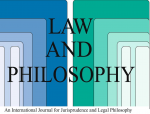This paper is an introduction to property theory including the invisible hand mechanism which handles the initiation and termination of property rights in an on-going private property market economy. The Fundamental Theorem is that when Hume’s conditions of no involuntary transfers and no breached contracts are fulfilled, then the Lockean principle of people getting the fruits of their labor, i.e., imputing legal responsibility in accordance with de facto responsibility is satisfied. The major application is to the current system of a private property market economy based on the renting of persons, i.e., the employment contract.
This is a reprint of the paper in the Journal of Economic Issues in Sept. 2014.
On Property Theory
Inalienable Rights: A Litmus Test for Liberal Theories of Justice
This paper published in the European journal, Law and Philosophy, examines the intellectual history of inalienable rights theory, and critically examines the work of liberal philosophers of justice, John Rawls and Robert Nozick, from that perspective.
Introduction to Property Theory
This is yet another unpublished paper to introduce property theory to various audiences, particularly economists.
The Libertarian Case for Slavery: A Note on Nozick
This is a historically important paper, by one “J. Philmore,” arguing along with Robert Nozick from a free-market libertarian viewpoint that the self-sale contract and the current employment or self-rental contract are on the same moral footing.
The Market Mechanism of Appropriation
This is a non-mathematical treatment of the fundamental theorem about the laissez faire mechanism for property appropriation.
Hume Implies Locke: Fundamental Theorem of Property Theory
The fundamental theorem for the invisible hand mechanism in the property system is that if Hume’s conditions are satisfied, then the invisible judge imputes in accordance with the Lockean responsibility principle. The paper mathematically formulates and proves the theorem using vector flows on graphs.
On Rawls and Nussbaum
This paper was delivered at a 2008 conference in Leuven on Martha Nussbaum’s book Frontiers of Justice. The paper was to be published in the conference proceedings, but somehow that never happened.
Rethinking Common vs. Private Property
The purpose of this paper is to suggest a rethinking of the common-versus-private framing of the property rights issue in the Commons Movement. The underlying normative principle we will use is simply the basic juridical principle that people should be legally responsible for the (positive and negative) results of their actions, i.e., that legal or de jure responsibility should be imputed in accordance with de facto responsibility. In the context of property rights, the responsibility principle is the old idea that property should be founded on people getting the (positive or negative) fruits of their labor, which is variously called the labor or natural rights theory of property.
Listen Libertarians! Concluding Part V
In this fifth and concluding part of the review of John Tomasi’s book Free Market Fairness, we look at the invisible hand mechanism of the property system (in contrast to the usual price system) which seems to be invisible to liberal scholars and social scientists since it does not give a satisfactory “account” of the current economic system based on the renting of human beings.



